Thursday, April 4. 2013
Against Publisher Deposit in Institutional Repositories
 Institutional agreements with publishers on proxy deposit into institutional repositories are an extremely bad idea, for a number of reasons:
Institutional agreements with publishers on proxy deposit into institutional repositories are an extremely bad idea, for a number of reasons: 1. The only sure way to achieve 100% open access is to have a rational, systematically verifiable system of deposit and monitoring.Hence it is a far more effective and far-sighted strategy for institutions to adopt effective, systematic, verifiable institutional OA self-archiving mandates (reinforced by funder mandates) than to be drawn into any side-deals with publishers, whether OA publishers or subscription publishers. (To do so is a Trojan Horse or a Faustian Bargain -- take your pick of metaphors!.)
2. Institutions are the providers of all research output, whether published in OA journals or subscription journals.
3. Spontaneous, unmandated OA self-archiving by authors is growing much too slowly.
4. The only way to accelerate OA to 100% is for authors' institiutions and funders to mandate OA self-archiving.
5. Institutions are the only ones in a position to systematically monitor and ensure OA mandate compliance, such that all of their research output is self-archived in their institutional repository.
6. If some deposits are institutional and some are institution-external (central), and some deposits are done by authors and some by publishers, it makes it impossible or extremely complicated to systematically monitor and ensure that all research output is deposited.
7. Self-archiving in the institutional repository immediately upon publication hence has to be made a mandatory part of the standard research work-flow for all institutional researchers (just a few extra keystrokes per paper upon acceptance for publication). (Even librarian proxy deposit is not a good idea.)
8. Instead allowing or encouraging publishers to do the deposit -- either paid OA publishers, or subscription publishers after their self-imposed embargoes have elapsed -- takes the control of OA provision out of the hands of authors and institutions, and leaves it in the hands of publishers.
Monday, March 11. 2013
Institutional Repository "Business Model" for Open Access Publishing?
 There is a profound latent conflation and incoherence in the question "What is the business model to support open access through institutional repositories?"
There is a profound latent conflation and incoherence in the question "What is the business model to support open access through institutional repositories?" It is a conflation between the business model for publishing and the "business" model for institutional repositories (IRs).
The conflation is also evident in any mention (in the context of IR costs) of peer review costs or of reviving university presses linked to repositories.
1. Green OA self-archiving is not a substitute for peer-reviewed subscription journal publishing: it is a supplement to it, for the purpose of providing access to all users, rather than just to subscribers.Please let us not be drawn into the fuzzy notions of certain critics of OA or of Green OA IRs, with hazy, incoherent questions about "business models" that naively conflate IR functions with publishing functions.
2. The function (and cost) of (the editorial management of) journal peer review is neither an institutional repository function (and cost) nor a university function (or cost).
3. Institutional repositories provide access (only) to their own research output.
4. Hence the notion of their doing their own peer review would amounts to a vanity press (self-publication).
5. Alternatively, if a university press produces a peer-reviewed journal that publishes research from other institutions, then that's just another Gold OA journal, not an IR function or cost.
IRs are created for many different purposes (some sensible, some not), Green OA being only one of those purposes. (Elaborate local IR search is a foolish function, for example; search will always take place at the multi-IR harvester level. Digital preservation is also not a straightforward function for institutional journal article output, at least not yet: Green OA IRs archive authors' final drafts, for access-supplemental purposes: that is not the draft that requires the preservation: the publisher's version of record is!)
IRs also store all sorts of other institutional objects, data and records. Those functions and their costs have nothing to do with OA and it is absurd for OA policy-makers to ask for a Green IR "business model" that includes those costs and functions.
Yet the IR start-up and maintenance costs (small though they are) are already covered in large part by the institutional sectors that require those non-OA IR functions. (I say "in large part" because without effective Green OA mandates, the Green OA content and function of IRs is minimal.)
Houghton & Swan's (2013) cost/benefit analyses stress that Green OA is a transitional strategy: It supplements subscription publishing and its costs by providing OA.
Houghton & Swan also have cost/benefit estimates for pure Gold OA publication, once subscriptions are gone.
But the question of "IR business model" cuts across these two, incoherently, as if they were both happening at the same time, which makes no sense whatsoever.
I have a more specific hypothesis about how this Green to Gold transition is likely to take place. At the very least, this hypothetical scenario has the virtue of keeping the respective expenses and "business models" in their proper places in the likely temporal sequence, rather than conflating them incoherently, in parallel:
I. Subscriptions prevail, as now.Hence the pre-emptive call for a Green IR "business model" at this time is both unrealistic and incoherent, showing a lack of understanding (or a simplistic misunderstanding) if what is really going on.
II. Green OA is universally mandated, by institutions and funders.
III. Green OA grows (anarchically, article by article, not systematically, journal by journal).
IV. So subscriptions continue to co-exist with Green OA, as Green OA grows, because journals cannot be cancelled by institutions until all or most of their contents are available to their users by another means (Green OA).
V. Once there is enough Green OA to make subscription cancellations significant (or even earlier), journals will have to prepare for the transition, by phasing out obsolete products and services, and their costs:
VI. The print edition and its costs will be phased out first. Then, once subscriptions approach unsustainability, the online edition (and its costs) will be phased out, and both access-provision and archiving (and their costs) will be offloaded onto the worldwide network of Green OA IRs.
VII. But the costs of access-provision and archiving will already be distributed across the worldwide network of Green OA IRs: the only difference will be that the Green OA final refereed draft will become the version of record.
VIII. Publishers' only remaining cost will be the editorial management of peer review.
IX. To cover this last remaining cost, publishers will convert to Gold OA, and institutions will pay for it, per outgoing article, out of a fraction of their subscription cancelation savings.
X. But publishing (peer review) and its costs will remain autonomous from the distributed IR access-provision and archiving and its costs.
"If OA were adopted worldwide, the net benefits of Gold OA would exceed those of Green OA. However, we are not in an OA world... At the institutional level, during a transitional period when subscriptions are maintained, the cost of unilaterally adopting Green OA is much lower than the cost of Gold OA – with Green OA self-archiving costing average institutions sampled around one-fifth the amount that Gold OA might cost, and as little as one-tenth as much for the most research intensive university. Hence, we conclude that the most affordable and cost-effective means of moving towards OA is through Green OA, which can be adopted unilaterally at the funder, institutional, sectoral and national levels at relatively little cost." [emphasis added]Houghton, John W. & Swan, Alma (2013) Planting the green seeds for a golden harvest: Comments and clarifications on “Going for Gold” D-Lib Magazine 19(1/2)
Houghton & Swan (2013)
Thursday, March 7. 2013
Arxiv Users: Think Beyond the Narrow Confines of Your Discipline
The problem that Open Access (OA) mandates are intended to solve is not in astrophysics: Astrophysicists have been providing OA, without the need of mandates, for almost as long as High Energy Physicists have, by depositing in Arxiv.
But researchers in other disciplines have not followed suit, for over 20 years now.
And they won't, unless OA is mandated.
And the only ones who can monitor and ensure that researchers in all disciplines comply with OA mandates are their institutions.
So astrophysicists would do a much greater service to global OA if they invested in implementing the automatic Arxiv exporter for deposits in their own institutional repositories (IRs).
OA Mandates that would require double-deposit from longstanding Arxiv users -- in both Arxiv and the author's IR -- would be outrageous and out of the question.
But an automatic exporter of IR deposits and their metadata to Arxiv (and any other central repository, such as PubMed Central or EuroCentral) would be a great step toward convergence and interoperability, and would greatly facilitate both the adoption of and compliance with Green OA self-archiving mandates from both funders and institutions.
Of course the extra investment funds are all fantasy, as the UK Gold OA funds are only to be paid to Gold OA journals, not to be spent on whatever the author wishes! But the support of veteran Arxiv users in favour of implementing automatic IR-to-Arxiv export capability would be a great help even without extra money. The functionality is already available, for both EPrints and DSpace IRs:
Create Export Plugins
Mandate deposit in Institutional Repositories and they will solve the access problem: Reply to M Taylor in LSE
All quotes are from:
"Institutional repositories have work to do if they’re going to solve the access problem" by Mike Taylor [MT] LSE Impact of Social Sciences 2013
Actually what Green OA does is provide access to the author’s draft for those who don’t have access to the publisher’s final version. The difference between night and day for those who have no access at all.
MT: "[Green OA] necessarily creates two classes of papers: author’s draft and publishers’ final versions.”
No “class” differences. Just a remedy for the difference between the Haves and the Have-Nots.
MT: "pagination will differ — which means you can’t cite page-numbers reliably.”Negligible loss. Cite by section heading and paragraph number. (Page numbers are obsolescent anyway.)
MT: "I have a paper in press now for which a whole additional figure… was added at the proofing stage.”Add the figure to your author’s draft.
(As Green grows, authors will learn to be more attentive about the needs of the Have-Nots among their potential users in a Green world: Scholarly practice will adapt to the medium, as it always does.)
MT: "[Green OA] creates two classes of researchers… those privileged few who have the “proper” papers and an underclass who have only manuscripts…. Gold OA solves this problem… Green doesn’t.”Gold solves this pseudo-problem at a hefty price, not just in terms of having to double-pay Gold fees out of scarce research funds, over and above existing subscription fees (which already pay for Green), but also in terms of restrictions on authors’ free choice of journal: a forced choice based on journal economic model instead of journal quality and track-record.
The RCUK Gold-preference mandate also encourages publishers to offer hybrid Gold OA and to extend embargoes on Green OA beyond RCUK limits (to force RCUK authors to pick and pay for Gold), thereby making it gratuitously harder for Have-Not nations (who cannot afford Gold) to mandate and provide Green. Pre-emptive Gold also locks-in journals’ current revenues and modus operandi — and does so even if journals offer a full subscription rebate on all Gold OA revenue.
Mandatory Gold also engenders author resentment and resistance.
In contrast, mandatory Green (if effectively mandated, with compliance verification and as an eligibility condition for research evaluation, as HEFCE has proposed for REF) provides OA for the Have-Nots (about 60% immediate-OA and about 40% Button-mediated Almost-OA for embargoed deposits) at no extra cost, with no constraint on authors’ free choice of journals.
Again, no “class” differences. Just a remedy for the difference between the Haves and the Have-Nots.
MT: "Green OA is[n't] cheaper than Gold. …the cost to the world of a paywalled paper (aggregated across all subscriptions) is about $5333. …no reason to think that will change under the Green model…”There is indeed reason. It’s through the (hybrid) Gold model -- which RCUK is perversely reinforcing -- that current overall publisher revenues will be locked in (along with double-dipping too, for sure). Even if all Gold payment is given back as a subscription rebate, the total amount paid to publishers remains unchanged.
In contrast, universal Green will force cost-cutting and downsizing by making subscriptions unsustainable:
Harnad, Stevan (2007) The Green Road to Open Access: A Leveraged Transition. In, Anna, Gacs (ed.) The Culture of Periodicals from the Perspective of the Electronic Age. L’Harmattan, 99-105. ABSTRACT: What the research community needs, urgently, is free online access (Open Access, OA) to its own peer-reviewed research output. Researchers can provide that in two ways: by publishing their articles in OA journals (Gold OA) or by continuing to publish in non-OA journals and self-archiving their final peer-reviewed drafts in their own OA Institutional Repositories (Green OA). OA self-archiving, once it is mandated by research institutions and funders, can reliably generate 100% Green OA. Gold OA requires journals to convert to OA publishing (which is not in the hands of the research community) and it also requires the funds to cover the Gold OA publication costs. With 100% Green OA, the research community’s access and impact problems are already solved. If and when 100% Green OA should cause significant cancellation pressure (no one knows whether or when that will happen, because OA Green grows anarchically, article by article, not journal by journal) then the cancellation pressure will cause cost-cutting, downsizing and eventually a leveraged transition to OA (Gold) publishing on the part of journals. As subscription revenues shrink, institutional windfall savings from cancellations grow. If and when journal subscriptions become unsustainable, per-article publishing costs will be low enough, and institutional savings will be high enough to cover them, because publishing will have downsized to just peer-review service provision alone, offloading text-generation onto authors and access-provision and archiving onto the global network of OA Institutional Repositories. Green OA will have leveraged a transition to Gold OA.
MT: "By contrast, even the publisher-influenced Finch estimates… almost exactly half of what we pay by the subscription model.”What those rosy estimates (based on a fantasy of universal conversion of publishers to pure Gold, under pressure from the RCUK mandate!) overlook is the double-payment that must continue while UK subscriptions remain the only way for UK institutional users to access subscription content.
MT: "the true cost of Gold OA is much, much less… half of all Gold OA articles are published at no cost to the author and that the average APC of the other half is about one twelfth of the cost for a paywalled article”Yes indeed, but that cost-free Gold half is unfortunately not the mainstream international journals that are really at issue in all this, for UK authors and users. And it’s that half that is spuriously lowering the average price of APCs well below what the UK Must-Have journals are charging, especially for hybrid Gold.
Mike, I think you too will eventually come to realize that the only way to attain what we both want — which, is not just embargoed Gratis Green, but an end of embargoes, as much Libre OA as users need and researchers want to provide, license reform, publishing reform, and Gold OA at a fair, affordable, sustainable price — is by first taking the compromise step of universally mandating immediate deposit of the author’s draft in the author’s institutional repository, and then letting Nature take its course.
The only thing standing between us and what we all want is keystrokes. Until we mandate those keystrokes, there will be little OA of any sort: Gratis or Libre, Green or Gold, immediate or embargoed.
MT: "there is nothing intrinsic to Green OA that means embargoes must be in place. It’s perfectly possible, and manifestly desirable, that no-embargo Green-OA mandates should be enacted, requiring that authors’ final manuscripts become available immediately on publication. But for whatever historical reasons (and I admit I find this baffling) there are few or no Green-OA mandates that do this. Even the best of them seem to allow a six-month delay; twelve months is not uncommon”Let me unbaffle you then, Mike:
It’s pushback from publishers, who then intimidate authors as well as institutional lawyers — while also lobbying and intimidating politicians. The result is that no one dares mandate un-embargoed Gratis Green (let alone unembargoed Libre Green), and most authors wouldn’t dare provide it even if it were mandated.
(And note that the Harvard-style "rights-retention" mandates not only allow author opt-outs [waivers], which means they are not really mandates at all, but -- as we will shortly be reporting -- they also lead (so far) to exceedingly low deposit rates -- 4% at Harvard and 28.5% at MIT, which is still below the global spontaneous un-mandated baseline self-archiving rate of about 30%, and, paradoxically, amounts to only half of both MIT's and Harvard's own remarkably high self-archiving rate of over 60%: That means only half of the papers that MIT authors self-archive free for all on the Web are deposited in MIT's IR and only 1/15th in the case of Harvard!)
Solution: mandate immediate deposit (no exceptions, no opt-outs, no waivers) and allow (minimal) embargoes on the allowable length of the embargo on access to the deposit. (The "ID/OA mandate.")
That will ensure that the Have-Nots at least gain 60% immediate OA + 40% Almost-OA (Button-mediated).
And then let Nature take its course. Once the keystrokes are being universally done, all you seek, Mike, will not be far behind.
But it will take much longer if we delay (embargo!) the universal adoption of the ID/OA compromise mandate by over-reaching instead for what is not within reach, rather than first grasping what is already fully within reach.
That is called letting the “best” get in the way of the better. And in advocating that, you are playing into the hands of the publisher lobby, which is also using embargoes (of their own making) along with license restrictions as an excuse for delaying the inevitable transition to OA as long as possible, and making sure it only happens on their terms, preserving their current revenue streams and modus operandi.
MT: "Similarly, there is no intrinsic reason why Green OA should mean non-open licences and Gold OA should mean truly open (BOAI-compliant) open access. And yet history has brought us to a point where is often how things are.”Once again: Grasp first what is within immediate reach and the rest will come. Join Finch instead, in deprecating Green, and you will get next to nothing.
MT: "Many institutions don’t even have an IR; or if they do it doesn’t work.”Most research-active institutions in the UK (and Europe, and the US and Canada and Australia) already have an IR, but it doesn’t “work” without an (effective) Green OA mandate from funders and institutions.
Any institution is a just piece of free software, some space on a server and some sysad start-up time away from having an IR.
MT: "Many scholars aren’t associated with an institution and so don’t know where they should deposit their manuscripts.”Few researchers are unaffiliated, but for them there is, for example, OpenDepot -- which is still just as empty as IRs — for want of mandates...
MT: "The use of IRs involves an institution-by-institution fragmentation, with different user interfaces, policies, etc.”Most IRs are highly interoperable. Mandate Green OA and they will be even more so.
(And distributed local deposit with central harvesting is not “fragmentation”: it’s the way of the Web! No one deposits directly in Google. The rest is down to metadata, interoperablity, and harvesting. But there’s no incentive to enrich those while the OA content itself is still so impoverished — for lack of mandates.)
MT: "For whatever reasons, many scholars do not bother to deposit their manuscripts in institution repositories.”You have just casually mentioned OA’s #1 problem for the past 20 years!
But what you forget to say is that even fewer scholars bother to publish in a Gold OA journal.
(With Green deposit [ID/OA], the only deterrent is keystrokes; but with Gold OA there’s price and journal-choice restrictions as further deterrents.)
The remedy is of course mandates. But mandates have to be adopted, and complied with. And that’s why they have to have all the parameters you are lamenting: Gratis, Green, author draft, embargoed. That’s the immediately reachable path of least resistance for mandate adoption and compliance.
But you have set aside thinking of what you’d ideally like to have right away, and think practically about how to get it, not spurning approximations and compromises only to end up with next to nothing.
MT: "Even when mandates are in place, compliance is often miserable, to the point where Peter Suber considers the 80% NIH compliance rate as “respectable”. It really isn’t. 100% is acceptable; 99% is respectable.”There it is again: Reality for the last 20 years has been at 10-40% OA, and you are dismissing as “miserable” a tried and proven means of generating at least 80%!
I don’t wish my 20 miserable years trying to reach OA on anyone, but maybe a dose would not do you any harm, Mike, to help you appreciate the difference between principled armchair wish-lists and practical delivery.
We don’t have another decade to waste on ineffectual over-reaching. (And that’s what’s been holding OA up for the past two decades too.)
(Your questions here are almost all a litany of repetition of the 38+ causes of Zeno’s Paralysis in this 15-year-old list. I could almost answer them by number!)
MT: "Many IRs have abject search facilities, often for example lacking the ability to restrict searches to papers that are actually available.”No one (except maybe institutional administrators and window-shopping prospective-students or staff) searches at the IR level!
IR metadata (and/or full-texts) are harvested (or imported/exported) at the central harvester/search-engine level (Scirus, BASE, MS Academic Search, Google Scholar) and that’s the level at which they are searched.
The central harvester-level search capabilities can be enriched greatly, and they will be, but there’s absolutely no point doing that now, with the sparse OA content that there is in IRs (or in any repository) today. Without mandates to provide that content, nuclear-powered search (and text-mining) capabilities would be spinning wheels.
(And in case you imagine that the solution is direct deposit in institution-external repositories: far from it. That just makes the problem of mandating OA worse, forcing authors to deposit willy-nilly in institution-external repositories — Arxiv, PMC, EuroPMC, etc. — and prevents institutions from being able to monitor compliance with deposit mandates, whether institutional or funder mandates.)
MT: "Many IRs impose unnecessary restrictions on the use of the materials they contain: for example, Bath’s repo prohibits further redistribution.”Most IRs are sensible (though they all make craven — and sometimes excess — efforts to comply with publisher copyright conditions and embargoes).
Once Green OA mandates become sufficiently widespread, IRs will get their acts together. For now, the essential thing is to get papers deposited. Once that is being done, globally, everything else we seek will come, and probably surprisingly quickly.
But not if we continue to carp at minor details like Bath’s overzealousness, as if they were symptoms of ineffectiveness of the Green mandate strategy. They are not. They are simply symptoms of ineffective institutional policy, easily fixed under pressure from other IRs that are doing it right.
MT: "There is no central point for searching all IRs (at least not one that is half-decent; I know about OAIster).”As above: IR metadata (and/or full-texts) are harvested (or imported/exported) at the central harvester/search-engine level (Scirus, BASE, MS Academic Search, Google Scholar) and that’s the level at which they are searched.
The central harvester-level search capabilities can be enriched greatly, and they will be, but there’s absolutely no point doing that now, with the sparse OA content that there is in IRs (or in any repository) today.
Without effective mandates to fill the IRs, central search is not much more “decent” than IR-level search: the OA content is simply far too sparse.
MT: "The quality of metadata within most IRs [is] variable at best”Without mandates to provide the content (and motivate the metadata enrichment) rich metadata on impoverished content are no help.
MT: "Use of metadata across IRs is inconsistent — hence many of the problems that render OAIster near-useless.”Scirus, BASE, MS Academic Search, Google Scholar and OAIster are all equally useless without the full-text content. The motivation to enrich and conform the IR metadata will grow with the content, not just as an end in itself.
MT: "Could these issues be addressed? Yes, probably; but ten years have unfortunately not done much to resolve them, so I don’t feel all that confident that the next ten will.”There is in reality only one issue: Getting the keystrokes to be mandated (and hence done). That’s what’s held us up for 20 years, while we ran off in every direction except the one that would get us to our goal.
It is time to pool efforts toward getting institutions and funders worldwide to adopt the Green OA mandates that will get us there. For that we have to stop focussing on fixing frills that are useless until and unless we first get the content deposited, and stop insisting on organic haute cuisine before we have even taken care of the famine of the Have-Nots.
“I have a feeling that when Posterity looks back at the last decade of the 2nd A.D. millennium of scholarly and scientific research on our planet, it may chuckle at us…. [T[here is[n't] any doubt in anyone’s mind as to what the optimal and inevitable outcome of all this will be: The Give-Away literature will be free at last online, in one global, interlinked virtual library, and its QC/C expenses will be paid for up-front, out of the S/L/P savings. The only question is: When? This piece is written in the hope of wiping the potential smirk off Posterity’s face by persuading the academic cavalry, now that they have been led to the waters of self-archiving, that they should just go ahead and drink!“
Harnad, S. (1999) Free at Last: The Future of Peer-Reviewed Journals. D-Lib Magazine 5(12) December 1999
Saturday, November 10. 2012
Martin Hall's Defence of the UK Finch Committee Recommendations

Comment on:This turns out to be a stunningly superficial defence of the Finch Report by one of its authors (and the one from whom one might have hoped for a much fuller grasp of the Green/Gold contingencies, priorities and pragmatics).
Martin Hall (2012) "Green or Gold? Open Access After Finch" UKSG Insights 25(3)
The substance of Martin Hall's defence of the Finch recommendation that the UK should (double-)pay for Gold instead of strengthening its mandate for Green is that (1) Gold provides the publisher's version of record, rather than just the author's peer-reviewed final draft, that (2) Gold provides text-mining rights and that (3) Gold is the way to solve the journal price problem.
What Hall does not even consider is whether the publisher's version of record and text-mining rights are worth the asking price of Gold, compared to cost-free Green. His account (like everyone else's) is also astonishingly vague and fuzzy about how the transition to Gold is to take place in the UK. And Hall (like Finch) completely fails to take the rest of the world into account. All the reckoning about the future of publishing is based on the UK's policy for its 6% share.
Hall quotes Peter Suber's objection but does not answer it; and he does not even bother to mention (nor give any sign of being aware of) the substance of my own many, very specific points of criticism about both the Finch recommendations and the RCUK policy. (This is rather consistent, however, since if Hall had given any of these points some serious thought, it is hard to see how he could have endorsed the Finch recommendations in the first place; most had already been made before Finch.)
The Swan/Houghton economic analyses, too, are cited by Hall, as if in support, but in fact not heeded at all.
It will be instructive to see whether the remarkable superficiality of Hall's defence of Finch is noticed by the UK academic community, or it is just catalogued as further "authoritative support" for Finch/RCUK.
Stevan Harnad
Monday, October 8. 2012
RCUK: Don't Follow the Wellcome Trust OA Policy Model!


Appended after my own overview below is a focused and insightful posting by Fred Friend: As RCUK re-thinks its policy draft, and makes the requisite corrections to ensure that all papers are deposited in an OA repository (Green OA), RCUK should on no account emulate the Wellcome Trust's policy of (1) paying publishers to deposit in the (2) Europe (formerly UK) PubMed Central Repository.
(1) The parties bound by an RCUK OA mandate are RCUK fundees, not publishers. Deposit itself (Green OA) should be a requirement, as a condition of RCUK funding, to be performed by the fundee, not something extra (Gold OA), to be paid extra for, and performed by, a 3rd party, the publisher.
In other words, deposit is self-archiving, by the funded. Moreover, verification of fundee compliance with the RCUK Green OA requirement can and should be focused on the fundee, not on a 3rd party that is not bound to comply with RCUK funding conditions, but simply paid for a product.
The incoherence of the present RCUK OA policy - a direct legacy of the Wellcome policy that RCUK is obviously using as its model -- is, as usual, the result of conflating Gold and Green OA, and putting all the emphasis on Gold OA. This policy definitely has not been an unmitigated success for the Wellcome Trust and is certainly not scalable to all of UK research, for all the reasons Fred mentions below (and many more besides). The Wellcome model should not be imitated by RCUK.
(2) Europe (formerly UK) PubMed Central (EPMC) is an OA collection of European biomedical articles. That's fine. Let there be many such OA subject collections, in many fields, and also global collections, across multiple fields, and across multiple countries. But such collections should on no account be the locus of direct deposit for authors complying with RCUK (or EU or US or individual institutions') self-archiving mandates.
The locus of deposit for complying -- once, and only once -- with either funder or institutional OA mandates should be the author's own institutional OA repository, from which central and global collections can then harvest. This engages institutions in monitoring and ensuring the compliance of their own researchers with both funder and institutional OA self-archiving mandates (Green OA), and it keeps publishers (and publisher payment for Gold OA, a separate matter) out of the loop.
(If an author wishes to pay to publish in a Gold OA journal, and has the funds to do it, that's fine. Then the Gold OA version can be the one the author deposits, rather than just the author's peer-reviewed final draft. But the deposit is in any case done by the author, in the author's institutional repository; and the compliance with the deposit mandate is monitored and verified by the author's institution, whether the mandate is from RCUK or from the institution itself, or both.)
To understand the dynamics, remember that no one deposits anything directly in Google: Google (and Yahoo, etc.) harvest from local websites. That's exactly the way it needs to be for central subject-based or country-based OA collections too, for the sake of compliance-verification by the RCUK fundee's institution and funder and to ensure that authors only ever have to self-archive their papers once: institutional deposit, automatically harvestable by (multiple) central collections (e.g. EPMC).
Stevan Harnad
Fred Friend (posted on JISC-REPOSITORIES):“Admitting that RCUK was "thinking about" mandatory repository deposit, Mr Thorley said that one idea was to expand the Europe (formerly UK) PubMed Central repository, which currently covers only biomedicine, to encompass all subjects to help publishers automate deposits.” [Mark Thorley of RCUK quoted in an article by Paul Jump in “Times Higher Education” of 4 October 2012.\
I wonder whose idea this was! I can make one or two guesses, but whoever suggested it, it is a bad idea! I welcomed the development of UK PubMed Central, until the point when Wellcome Trust started to pay some publishers to make the deposit on behalf of authors and funders. I do not know whether Wellcome will disclose the sums paid to publishers, but my impression is that whatever is being paid more than covers the cost of making the deposit and is in effect a payment to publishers for open access and re-use rights. When people I know who are not in academia ask me about my work and I explain that I am working for open access to taxpayer-funded research, this is welcomed by whoever I am speaking to – until I say that many publishers are asking to be paid by taxpayers for making articles open access, at which point the welcome from my listener turns to incredulity. Even more incredulity if I mention the level of payments being requested for APCs. So, if RCUK were to go down the road of paying publishers to deposit in Europe PubMed Central, they should be prepared for challenges on such a mis-use of public money, especially if the deposit payment were to be in addition to the payment of an APC. Presumably the existing funders of UKPMC – some of them charities – would also expect a contribution from the non-biomedical RCs towards the high cost of running Europe PMC. This “idea” could cost a lot of money.
I suspect that there will also be objections from subject groups who see their repository needs as being very different from those of the biomedical community. How many times in my long career have I heard that other such all-embracing proposals will not work for subject x or y! UKPMC is a wonderful service for the biomedical community, a service for which they are prepared to pay and have the resources to pay, but its design will not fit all subjects without major modification. Already I hear some concern about the undue influence of the biomedical community and Wellcome in particular upon the Finch Report and thus upon Government policy. The suspicion is that the open access policy of the Wellcome Trust, which works very well for the Trust and for the biomedical community, is being adopted for all UK research outputs without consideration of the way the Trust’s open access decisions can be applied within other very different academic structures.
RCUK: please think again! It is good that you are considering mandatory repository deposit, but there are other repositories which can provide better value for the service you need.
Fred Friend
Friday, June 22. 2012
Finch Fiasco in Figures
The Finch Report, under strong and palpable influence from the publishing lobby, instead of recommending extending and optimizing the UK's worldwide lead in providing Green OA, cost-free, through institutional and funder self-archiving mandates, has recommended abandoning Green OA and Green OA mandates and instead spending extra money (£50-60 million yearly) on paying publishers' Gold OA fees as well as a UK blanket national site-license fee to cover whatever is not yet Gold OA (i.e., all the journals that UK institutions currently subscribe to, rather like the "Big Deals" publishers have been successfully negotiating with individual institutions and consortia):
1. Mandated vs. Unmandated Green OA (20% vs 70%+):

2. Rise of Green Mandates:
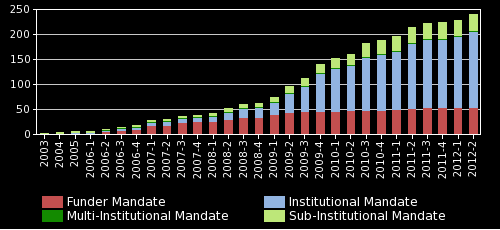
3. Rise of Green OA, 2009-2011:
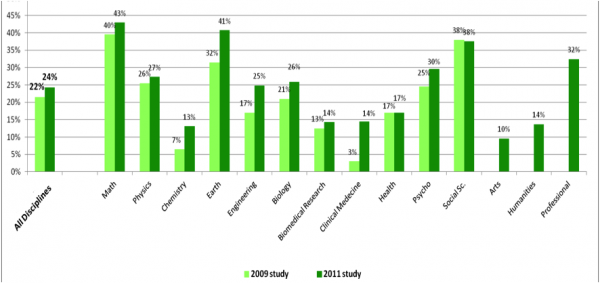
4. Rise of Gold OA 2003-2011 (from Nature, 2012)
(N.B.: Re-scaled at right for accurate comparison with rise of Green, above):

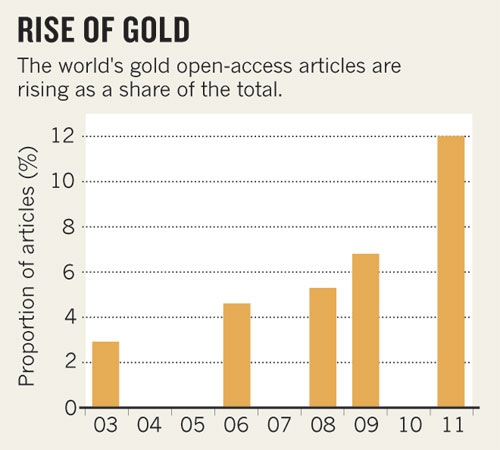
5. Projected rise of Gold OA (70% in 2020 or 2026; 100% in 2022 or 2029):
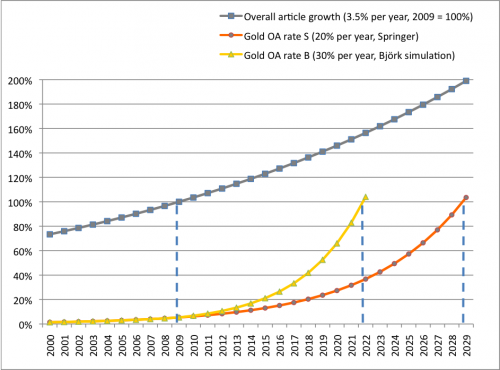
6. Relative Green and Gold OA Worldwide in 2010
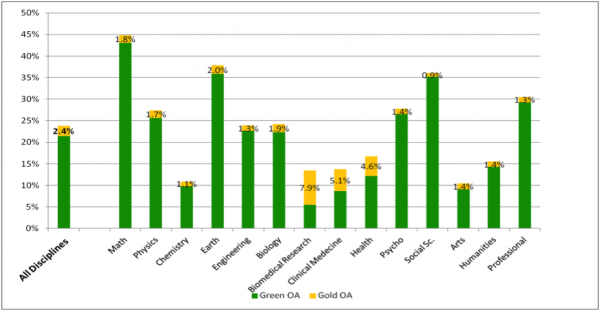
7. Relative Green and Gold OA in United Kingdom in 2010 (from Nature, 2012)
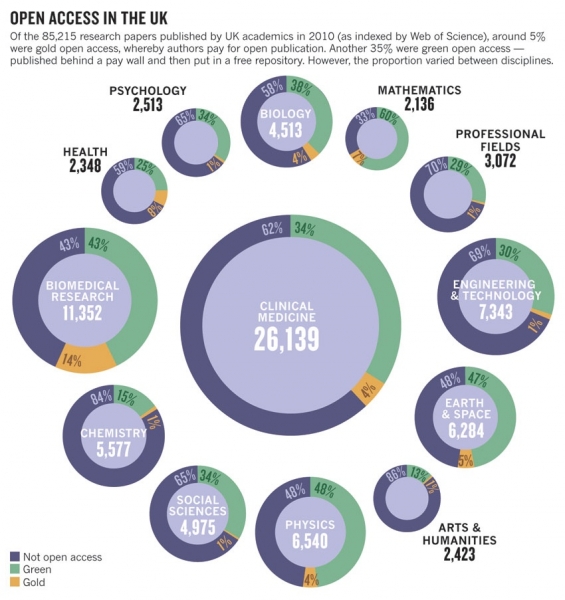
8. The OA Citation Impact Advantage: (OA vs. non-OA)
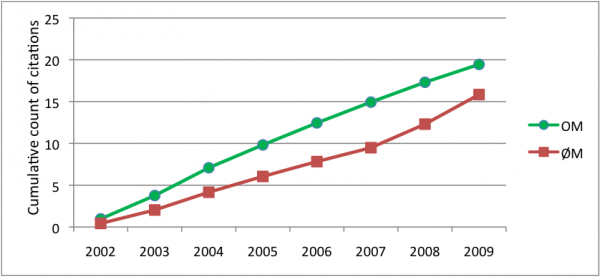
9. The OA Economic Advantage for the United Kingdom:
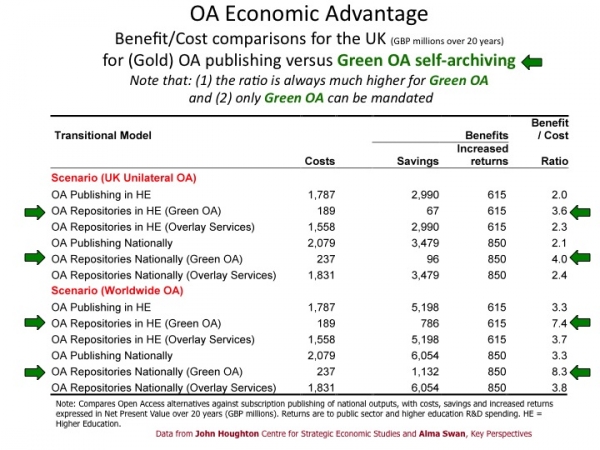
Björk B-C, Welling P, Laakso M, Majlender P, Hedlund T, et al. (2010) Open Access to the Scientific Journal Literature: Situation 2009. PLoS ONE 5(6): e11273.
Finch, Dame Janet et al (2012) Accessibility, sustainability, excellence: how to expand access to research publications. Report of the Working Group on Expanding Access to Published Research Findings
Gargouri, Y., Hajjem, C., Lariviere, V., Gingras, Y., Brody, T., Carr, L. and Harnad, S. (2010) Self-Selected or Mandated, Open Access Increases Citation Impact for Higher Quality Research. PLOS ONE 5 (10) e13636
Gargouri, Yassine; Vincent Larivière, Yves Gingras, Les Carr, Stevan Harnad (2012) Green and Gold Open Access Percentages and Growth, by Discipline. In, 17th International Conference on Science and Technology Indicators (STI), 5-8 September, 2012, Montreal, Quebec, Canada
Harnad, S. (2007) The Green Road to Open Access: A Leveraged Transition. In: Anna Gacs. The Culture of Periodicals from the Perspective of the Electronic Age L'Harmattan. 99-106.
Harnad, S. (2010) No-Fault Peer Review Charges: The Price of Selectivity Need Not Be Access Denied or Delayed. D-Lib Magazine 16 (7/8).
Harnad, S. (2010) The Immediate Practical Implication of the Houghton Report: Provide Green Open Access Now. Prometheus 28 (1): 55-59.
Harnad, S. (2011) Gold Open Access Publishing Must Not Be Allowed to Retard the Progress of Green Open Access Self-Archiving Logos: The Journal of the World Book Community 21(3-4): 86-93
Hitchcock, Steve (2012) The effect of open access and downloads ('hits') on citation impact: a bibliography of studies.
Houghton, J.W. & Oppenheim, C. (2009) The Economic Implications of Alternative Publishing Models. Prometheus
Houghton, J.W., Rasmussen, B., Sheehan, P.J., Oppenheim, C., Morris, A., Creaser, C., Greenwood, H., Summers, M. and Gourlay, A. (2009). Economic Implications of Alternative Scholarly Publishing Models: Exploring the Costs and Benefits, London and Bristol: The Joint Information Systems Committee (JISC).
Houghton, John, Swan, Alma and Brown, Sheridan (2011) Access to research and technical information in Denmark. Report to The Danish Ministry of Science, Technology and Innovation (FI) and Denmark's Electronic Research Library (DEFF)
Laakso M, Welling P, Bukvova H, Nyman L, Björk B-C, et al. (2011) The Development of Open Access Journal Publishing from 1993 to 2009. PLoS ONE 6(6): e20961. doi:10.1371/journal.pone.0020961
Poynder, Richard (2011) Open Access by Numbers. Open and Shut, 19 June 2011
ROAR Registry of Open Access Repositories
ROARMAP Registry of Open Access Repositories Mandatory Archiving Policies
Van Noorden, Richard (2012) Britain aims for broad open access. Nature News 19 January 2012.

Finch on Green: "The [Green OA] policies of neither research funders nor universities themselves have yet had a major effect in ensuring that researchers make their publications accessible in institutional repositories… [so] the infrastructure of subject and institutional repositories should [instead] be developed [to] play a valuable role complementary to formal publishing, particularly in providing access to research data and to grey literature, and in digital preservation [no mention of Green OA]…"Now here are some of the actual figures behind the above assertions. Let readers come to their own conclusions about the relative success, cost, benefits, cost-effectiveness, growth potential and timetable of mandating Green OA vs funding Gold OA:
Finch on Gold: "Gold" open access, funded by article charges, should be seen as "the main vehicle for the publication of research"… Public funders should establish "more effective and flexible arrangements" to pay [Gold OA] article charges… During the transition to [Gold] open access, funding should be found to extend licences [subscriptions] for non-open-access content to the whole UK higher education and health sectors…
1. Mandated vs. Unmandated Green OA (20% vs 70%+):

2. Rise of Green Mandates:

3. Rise of Green OA, 2009-2011:

4. Rise of Gold OA 2003-2011 (from Nature, 2012)
(N.B.: Re-scaled at right for accurate comparison with rise of Green, above):


5. Projected rise of Gold OA (70% in 2020 or 2026; 100% in 2022 or 2029):

6. Relative Green and Gold OA Worldwide in 2010

7. Relative Green and Gold OA in United Kingdom in 2010 (from Nature, 2012)

8. The OA Citation Impact Advantage: (OA vs. non-OA)

9. The OA Economic Advantage for the United Kingdom:

Björk B-C, Welling P, Laakso M, Majlender P, Hedlund T, et al. (2010) Open Access to the Scientific Journal Literature: Situation 2009. PLoS ONE 5(6): e11273.
Finch, Dame Janet et al (2012) Accessibility, sustainability, excellence: how to expand access to research publications. Report of the Working Group on Expanding Access to Published Research Findings
Gargouri, Y., Hajjem, C., Lariviere, V., Gingras, Y., Brody, T., Carr, L. and Harnad, S. (2010) Self-Selected or Mandated, Open Access Increases Citation Impact for Higher Quality Research. PLOS ONE 5 (10) e13636
Gargouri, Yassine; Vincent Larivière, Yves Gingras, Les Carr, Stevan Harnad (2012) Green and Gold Open Access Percentages and Growth, by Discipline. In, 17th International Conference on Science and Technology Indicators (STI), 5-8 September, 2012, Montreal, Quebec, Canada
Harnad, S. (2007) The Green Road to Open Access: A Leveraged Transition. In: Anna Gacs. The Culture of Periodicals from the Perspective of the Electronic Age L'Harmattan. 99-106.
Harnad, S. (2010) No-Fault Peer Review Charges: The Price of Selectivity Need Not Be Access Denied or Delayed. D-Lib Magazine 16 (7/8).
Harnad, S. (2010) The Immediate Practical Implication of the Houghton Report: Provide Green Open Access Now. Prometheus 28 (1): 55-59.
Harnad, S. (2011) Gold Open Access Publishing Must Not Be Allowed to Retard the Progress of Green Open Access Self-Archiving Logos: The Journal of the World Book Community 21(3-4): 86-93
Hitchcock, Steve (2012) The effect of open access and downloads ('hits') on citation impact: a bibliography of studies.
Houghton, J.W. & Oppenheim, C. (2009) The Economic Implications of Alternative Publishing Models. Prometheus
Houghton, J.W., Rasmussen, B., Sheehan, P.J., Oppenheim, C., Morris, A., Creaser, C., Greenwood, H., Summers, M. and Gourlay, A. (2009). Economic Implications of Alternative Scholarly Publishing Models: Exploring the Costs and Benefits, London and Bristol: The Joint Information Systems Committee (JISC).
Houghton, John, Swan, Alma and Brown, Sheridan (2011) Access to research and technical information in Denmark. Report to The Danish Ministry of Science, Technology and Innovation (FI) and Denmark's Electronic Research Library (DEFF)
Laakso M, Welling P, Bukvova H, Nyman L, Björk B-C, et al. (2011) The Development of Open Access Journal Publishing from 1993 to 2009. PLoS ONE 6(6): e20961. doi:10.1371/journal.pone.0020961
Poynder, Richard (2011) Open Access by Numbers. Open and Shut, 19 June 2011
ROAR Registry of Open Access Repositories
ROARMAP Registry of Open Access Repositories Mandatory Archiving Policies
Van Noorden, Richard (2012) Britain aims for broad open access. Nature News 19 January 2012.

Sunday, May 13. 2012
How Elsevier Can Improve Its Public Image
What rights do I retain as a journal author?

Along with the majority of refereed journal publishers today, Elsevier is a "Green" publisher, meaning Elsevier has formally endorsed immediate (unembargoed) institutional Green OA self-archiving by its authors ever since 27 May 2004.
Recently, however, a new clause has been added to "Authors' Rights and Responsibilities," the document in which Elsevier formally recognizes its authors' right to make their final, peer-reviewed drafts Open Access immediately upon publication (no embargo) by posting them on their institutional website (Green Gratis OA). The new clause is:
"but not in institutional repositories with mandates for systematic postings."The distinction between an institutional website and an institutional repository is bogus.
The distinction between nonmandatory posting (allowed) and mandatory posting (not allowed) is arbitrary nonsense. ("You retain the right to post if you wish but not if you must!")
The "systematic" criterion is also nonsense. (Systematic posting would be the institutional posting of all the articles in the journal; but any single institution only contributes a tiny, arbitrary fraction of the articles in any journal, just as any single author does; so the mandating institution is not a 3rd-party "free-rider" on the journal's content: its researchers are simply making their own articles OA, by posting them on their institutional website, exactly as described.)
This "systematic" clause is hence pure FUD, designed to scare or bully or confuse institutions into not mandating posting, and to scare or bully or confuse authors into not complying with their institutional mandates. (There are also rumours that in confidential licensing negotiations with institutions, Elsevier has been trying to link bigger and better pricing deals to the institution's agreeing not to adopt a Green OA mandate.)
Elsevier's public image is so bad today that rescinding its Green light to self-archive after almost a decade of mounting demand for OA is hardly a very attractive or viable option.
And double-talk, smoke-screens and FUD are even less attractive or viable.
It will hence very helpful in helping researchers to provide -- and their institutions and funders to mandate -- Open Access if Elsevier drops its "you may if you wish but not if you must" clause.
It will also help to improve Elsevier's public image.
Stevan Harnad
Thursday, September 8. 2011
Self-Archive Institutionally, Harvest Centrally
In the Hedda Blog, Chris Maloney (Contractor for PubMed Central) asked:
Comments invited -- but please don't post them here but in the Higher EDucation Development Association (HEDDA) blog.
"Assuming the article is in the biomedical field, can authors simultaneously put a copy of their manuscript in their institution’s repository, and upload it to PMC through the NIHMS? Or does the article have to be funded by the NIH for them to do this?… The reason I ask question #2 is that I am wondering if just putting a manuscript [in]to an IR is enough to truly make the article visible and accessible. Just because something’s on the web doesn’t mean it will be found. Just because something’s indexed by Google doesn’t mean it will have high rank in their search results. Putting a manuscript on PMC, through NIHMS or other channels, means that it would be indexed in PubMed, which would make it more accessible."This an extremely important practical issue, and at the moment it is not being properly implemented.
The short answer is, yes, a document deposited in the author's institutional repository (IR) can be uploaded to PMC through NIHMS, regardless of whether NIH has funded the research (and, a fortiori, regardless of whether NIH has funded extra "gold" OA publication fees).
But those extra author self-archiving steps should not be necessary! The reason it became apparent that green OA self-archiving mandates (from both institutions and funders) would be necessary was that spontaneous, unmandated self-archiving rates remain low (about 20%), even when recommended or encouraged by institutions and funders. That's why the first NIH OA policy, a request, failed until it was upgraded to a requirement.
But the practical implementation of the NIH mandate was still short-sighted: It required direct deposit in PMC, and allowed this to be done by either the author or the publisher. The result was not only (1) uncertainty about who needed to deposit what, when, not only (2) a partial reliance on a 3rd party other than the fundee, not bound by the grant, namely, the publisher, to fulfill the conditions of a grant to the fundee, but it also (3) imposed a double burden on fundees if their own institutions were to mandate self-archiving too: They had to deposit in their own IRs and also in PMC.
This did not help either with encouraging more institutions to adopt self-archiving mandates (even though institutions are the universal providers of all research, funded and unfunded, across all disciplines) nor with encouraging authors, already sluggish about self-archiving at all, to comply with self-archiving mandates (since they might be faced with having to deposit the same paper many times).
Yet in reality, the problem is merely a formal one, not a technical one. Software (e.g., SWORD) can import and export the contents of one repository to another automatically. More important: There is no need for institutional authors ever to have to self-archive directly in an institution-external (central) repository like PMC: The contents of IRs are all OAI-compliant and harvestable automatically by whatever central repositories might want them.
So institutional and funder mandates need to be collaborative and convergent, not competitive and divergent, as some (including NIH's) are now. And the convergence needs to be on institution-internal deposit, followed by central harvesting (e.g. to PMC) where desired -- certainly not the reverse.
"Deposit institutionally, harvest centrally." This not only encourages institutions to adopt their own mandates, to complement funder mandates and cover the entire OA target corpus, but it also puts institutions in a position to monitor and ensure compliance with funder mandates. (Ensuring that all funder grant fulfillment conditions are met is something that institutions are always very eager to do!)
(The visibility/accessibility worry is, I think, a red herring: OAI-compliant institutional repositories are harvested by Google, Google Scholar, BASE. citeseerx and many other search engines, including OAI-specific ones. And besides, IR metadata and documents can also be harvested into central repositories like PMC and UK-PMC. The only real factor in visibility and accessibility is whether or not an article has been made green OA at all! Where it is made OA matters little, and it matters less and less as more and more is made OA.)
See:
"How to Integrate University and Funder Open Access Mandates"Summary: Research funder open-access mandates (such as NIH's) and university open-access mandates (such as Harvard's) are complementary. There is a simple way to integrate them to make them synergistic and mutually reinforcing:
Universities' own Institutional Repositories (IRs) are the natural locus for the direct deposit of their own research output: Universities (and research institutions) are the universal research providers of all research (funded and unfunded, in all fields) and have a direct interest in archiving, monitoring, measuring, evaluating, and showcasing their own research assets -- as well as in maximizing their uptake, usage and impact.
Both universities and funders should accordingly mandate deposit of all peer-reviewed final drafts (postprints), in each author's own university IR, immediately upon acceptance for publication, for institutional and funder record-keeping purposes. Access to that immediate postprint deposit in the author's university IR may be set immediately as Open Access if copyright conditions allow; otherwise access can be set as Closed Access, pending copyright negotiations or embargoes. All the rest of the conditions described by universities and funders should accordingly apply only to the timing and copyright conditions for setting open access to those deposits, not to the depositing itself, its locus or its timing.
As a result, (1) there will be a common deposit locus for all research output worldwide; (2) university mandates will reinforce and monitor compliance with funder mandates; (3) funder mandates will reinforce university mandates; (4) legal details concerning open-access provision, copyright and embargoes will be applied independently of deposit itself, on a case by case basis, according to the conditions of each mandate; (5) opt-outs will apply only to copyright negotiations, not to deposit itself, nor its timing; and (6) any central OA repositories can then harvest the postprints from the authors' IRs under the agreed conditions at the agreed time, if they wish.
Comments invited -- but please don't post them here but in the Higher EDucation Development Association (HEDDA) blog.
Saturday, August 13. 2011
Arxiv's Funding Pains May Be A Wake-Up Call: Distributed Versus Central Archiving


Comments on:Anonymous FTP archives. Arxiv (1991) was an invaluable milestone on the road to Open Access. But it was not the first free research-sharing site: That began in the 1970's with the internet itself, with authors making their papers freely accessible to all users net-wide by self-archiving them in their own local institutional "anonymous FTP archives."Ginsparg, Paul (2011) Arxiv at 20. Nature 476: 145–147 doi:10.1038/476145a
&
Fischman, Josh (2011) Anonymous FTP Achives. The First Free Research-Sharing Site, arXiv, Turns 20 With an Uncertain Future. Chronicle of Higher Education August 10, 2011
Distributed local websites. With the creation of the world wide web in 1990, HTTP began replacing FTP sites for the self-archiving of papers on authors' institutional websites. FTP and HTTP sites were mostly local and distributed, but accessible free for all, webwide. Arxiv was the first important central HTTP site for research self-archiving, with physicists webwide all depositing their papers in one central locus (first hosted at Los Alamos). Arxiv's remarkable growth and success were due to both its timeliness and the fact that it had emerged from a widespread practice among high energy physicists that had already predated the web, namely, to share hard copies of their papers before publication by mailing them to central preprint distribution sites such as SLAC and CERN.
Central harvesting and search. At the same time, while physicists were taking to central self-archiving, in other disciplines (particularly computer science), distributed self-archiving continued to grow. Later web developments, notably google and webwide harvesting and search engines, continued to make distributed self-archiving more and more powerful and attractive. Meanwhile, under the stimulus of Arxiv itself, the Open Archives Initiative (OAI) was created in 1999 -- a metadata-harvesting protocol that made all distributed OAI-compliant websites interoperable, as if their distributed local contents were all in one global, searchable archive.
No need for direct central deposit in google! Together, google and OAI probably marked the end of the need for central archives. The cost and effort can instead be distributed across institutions, with all the essential search and retrieval functionality provided by automated central "overlay" services for harvesting, indexing, search and retrieval (e.g., OAIster, Scirus, Base and Google Scholar). Arxiv continues to flourish, because two decades of invaluable service to the physics community has several generations of users deeply committed to it. But no other dedicated central archive has arisen since. Like computer scientists, whose local, distributed self-archiving is harvested centrally by Citeseerx, economists, for example, self-archive institutionally, with central harvesting by RepEc.
Mandating self-archiving. In biomedicine, PubMed Central looks to be an exception, with direct central depositing rather than local. But PubMed Central was not a direct author initiative, like anonymous FTP, author websites or Arxiv. It was designed by NLM, deposit was mandated by NIH, and deposit is done not only by authors but by publishers.
Institutions are the universal research providers. Open Access is still growing far more slowly than it might, and one of the factors holding it back might be notional conflicts between institutional and central archiving. It is clear that Open Access self-archiving will have to be universally mandated, if all disciplines are to enjoy its benefits (maximized research access, uptake, usage and impact, minimized costs). The universal providers of all research paper output, funded and unfunded, are the world's universities and research institutions, distributed globally across all scholarly and scientific disciplines, all languages, and all national boundaries.
Deposit institutionally, harvest centrally. Hence funder self-archiving mandates like NIH's and institutional self-archiving mandates like Harvard's need to join forces to reinforce one another rather than to complete for the same papers, and the most natural, efficient and economical way to do this is for both institutiions and funders to mandate that all self-archivingshould be done locally, in the author's institutional OAI-compliant repository. The contents of the institutional repositories can then be harvested automatically by central OAI-compliant repositories such as PubMed Central (as well as by google and other central harvesters) for global indexing and search.
Distribute the archiving, rather than the cost. In this light, Arxiv's self-funding pains may be a wake-up call: Why should Cornell University (or a "wealthy donor") subsidize a cost that institutions can best "sponsor" by each doing (and mandating) their own distributed archiving locally (thereby reducing total cost, to boot)? After all, no one deposits directly in Google…
Stevan Harnad
EnablingOpenScholarship
"How to Integrate University and Funder Open Access Mandates"
SUMMARY: Research funder open-access mandates (such as NIH's) and university open-access mandates (such as Harvard's) are complementary. There is a simple way to integrate them to make them synergistic and mutually reinforcing:
Universities' own Institutional Repositories (IRs) are the natural locus for the direct deposit of their own research output: Universities (and research institutions) are the universal research providers of all research (funded and unfunded, in all fields) and have a direct interest in archiving, monitoring, measuring, evaluating, and showcasing their own research assets -- as well as in maximizing their uptake, usage and impact.
Both universities and funders should accordingly mandate deposit of all peer-reviewed final drafts (postprints), in each author's own university IR, immediately upon acceptance for publication, for institutional and funder record-keeping purposes. Access to that immediate postprint deposit in the author's university IR may be set immediately as Open Access if copyright conditions allow; otherwise access can be set as Closed Access, pending copyright negotiations or embargoes. All the rest of the conditions described by universities and funders should accordingly apply only to the timing and copyright conditions for setting open access to those deposits, not to the depositing itself, its locus or its timing.
As a result, (1) there will be a common deposit locus for all research output worldwide; (2) university mandates will reinforce and monitor compliance with funder mandates; (3) funder mandates will reinforce university mandates; (4) legal details concerning open-access provision, copyright and embargoes will be applied independently of deposit itself, on a case by case basis, according to the conditions of each mandate; (5) opt-outs will apply only to copyright negotiations, not to deposit itself, nor its timing; and (6) any central OA repositories can then harvest the postprints from the authors' IRs under the agreed conditions at the agreed time, if they wish.
« previous page
(Page 2 of 9, totaling 85 entries)
» next page
EnablingOpenScholarship (EOS)
Quicksearch
Syndicate This Blog
Materials You Are Invited To Use To Promote OA Self-Archiving:
Videos:
audio WOS
Wizards of OA -
audio U Indiana
Scientometrics -
The American Scientist Open Access Forum has been chronicling and often directing the course of progress in providing Open Access to Universities' Peer-Reviewed Research Articles since its inception in the US in 1998 by the American Scientist, published by the Sigma Xi Society.
The American Scientist Open Access Forum has been chronicling and often directing the course of progress in providing Open Access to Universities' Peer-Reviewed Research Articles since its inception in the US in 1998 by the American Scientist, published by the Sigma Xi Society.
The Forum is largely for policy-makers at universities, research institutions and research funding agencies worldwide who are interested in institutional Open Acess Provision policy. (It is not a general discussion group for serials, pricing or publishing issues: it is specifically focussed on institutional Open Acess policy.)
You can sign on to the Forum here.
Archives
Calendar
|
|
May '21 | |||||
| Mon | Tue | Wed | Thu | Fri | Sat | Sun |
| 1 | 2 | |||||
| 3 | 4 | 5 | 6 | 7 | 8 | 9 |
| 10 | 11 | 12 | 13 | 14 | 15 | 16 |
| 17 | 18 | 19 | 20 | 21 | 22 | 23 |
| 24 | 25 | 26 | 27 | 28 | 29 | 30 |
| 31 | ||||||
Categories
Blog Administration
Statistics
Last entry: 2018-09-14 13:27
1129 entries written
238 comments have been made



